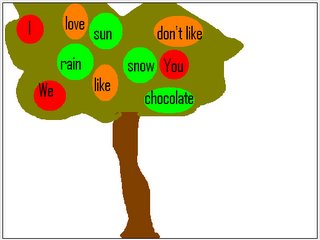Yesterday I attended an interesting and much needed seminar on teaching very young learners, aged 5 to 8. The speakers, workshop leaders, were Irena Rozman, OUP ELT Representative for Slovenia and Clare Matthews, a teacher and teacher-trainer from England, who came to Slovenia four years ago.
Rozman talked about the general characteristics of small children, emphasizing that we should apply
multi-sensory approach to fully develop the potential of children who are still developing emotionally, socially, physically, intellectually, etc. We should vary activities and their pace as well as take their age specific behaviour into consideration.
Small children simply can't hide their feelings and they share their joy or sadness with us, also depending on whether they are extrovert or introvert, anxious or confident personalities. To help them acquire the language successfully we should provide them
immersion, as much as possible, encourage
imitation (through miming, repeating, singing, dancing...), emphasize
interaction (through TPR, questions, stories), and support their
internalisation of the language (by encouraging them to speak and by remodeling their words). Teacher of young children should be fun, but firm, and should value the kids individually. The
child has to be put in the
centre, while learning about very
concrete and familiar topics, as well as
daily routine and events.
Matthews stressed the importance of keeping children focused and entertained to enhance the learning experience. She showed us the benefits of using
hand puppets,
masks, and
colourful wall displays, as well as
decorated shoe boxes for collecting the vocabulary flashcards.
Building a monster was also great - with two heads, one tail, three legs... body parts vocabulary being practised in a fun way. I also learned a new song that goes with the tune of Ten Green Bottles Sitting on the Wall:
Red, pink, yellow, purple, green or blue,
red, pink, yellow, purple, green or blue.
What's your favourite colour?
Please tell me do!
Is it red, pink, yellow, purple green or blue?
Rozman talked about gradual introduction of writing and reminded us on variety of tools (such as crayons, pastels, chalks, paint...) and surfaces (such as chalkboard, shaped pieces of coloured, differently-sized paper, card, stones...) that can be used to raise their motivation. At
pre-writing level we are developing children's basic skills such as distinguishing and recognizing different shapes, as well as gross and fine motor skills (e.g. SNAP game). At
letter-level they learn the shape and name of letters, also the alphabet. Another nice song, new to me, goes to the tune of Are You Sleeping Brother John:
Letter A, letter A!
Where are you? Where are you?
Here in 'apple', 'ant', and 'Anna',
'alphabet' too, 'alphabet' too.
Letter B, letter B!
where are you? Where are you?
Here in 'bat', 'big' and 'bad',
'banana' too, 'banana' too.
...
When we come to
word level, children can start recognizing words by just saying yes/no when you show them the flashcards with pictures. For example, you write down the word 'lion' and then show pictures of different animals. Children say no, no, no... until the picture and the word match.
Another interesting activity that shouldn't be forgotten when teaching the pronunciation is clapping the syllables of the word, e.g. ba-by.
To help building child's visual memory of written words, this activity can be used:
look
say
cover
write
check
First children have a
look at the word, then we
say it aloud, teacher
covers it, they
write it down and finally
check how successful they were.
A very interesting piece of advice was that we should use
low key letters because they are more easily distinguishable than high key letters (!).
At the
sentence level we teach children word order and some useful chunks of language with hidden grammar. A great way to do it is by following "traffic lights rule" (I guess this activity is taken from
Writing with Children, J. and V. Reilly, OUP, 2005). You prepare a tree with colourful leaves:

Later you tell them to follow the "traffic lights rule". For children this is an easy way to build simple sentences and gradually get familiar with the pattern.

These were just some of the seminar high points. Considering the fact that it lasted only about three hours, I
really learned a lot and enjoyed listening to two great presenters. Thanks, Oxford Center Ljubljana :)







